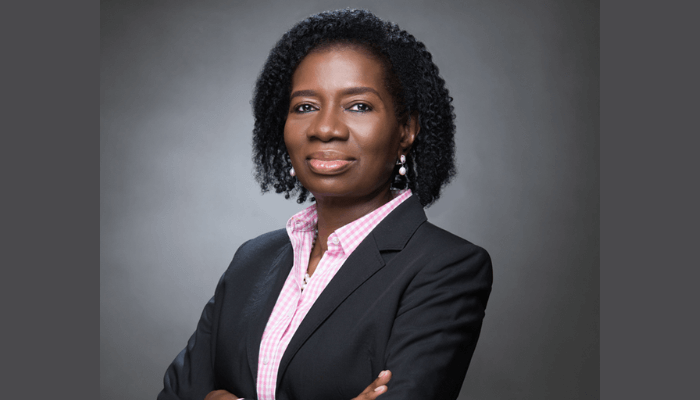The appointment of Olubunmi Fayokun as Chairman of Aluko & Oyebode marks a historic moment for Nigeria’s legal industry. For the first time since its founding in 1993, a leading full-service law firm will be led by three women. With over three decades of experience in capital markets and corporate finance, Fayokun brings a track record of advising on some of Nigeria’s most significant transactions. In this interview, she reflects on her journey, her vision, and what this new chapter means for the next generation of lawyers.
Could you tell us a bit about your journey to the top at Nigeria’s leading full-service law firm and what does this new role mean to you personally and professionally?
My professional journey has been anything but linear and that is part of what has made it so enriching. I began my career in private legal practice in Lagos in the late ’80s, when very few women were in corporate law, let alone in boardrooms. After my mandatory national youth service year, I worked briefly at Odujinrin & Adefulu and later ran my own boutique practice. That entrepreneurial experience taught me resilience, the kind that comes from negotiating contracts in the morning and chasing court files in the afternoon!
A crucial moment in my career came when I moved into the corporate world as the pioneer Company Secretary and Legal Adviser of Denham Management Limited in 1994. The company would later go on to merge with the Chapel Hill Advisory Partners Limited to form the Chapel Hill Denham Group. That role gave me insights into how businesses think, how transactions are structured, and the critical importance of legal support, assistance and advice in the execution of successful deals.
I joined Aluko & Oyebode in 1999 as I wanted to bring both legal precision and business insight to the table and I saw that same ambition in the firm’s DNA. The then Managing Partner and Co-founder, Gbenga Oyebode, invited me to lead the Capital Markets and M&A practice, a role I have held since then until my recent appointment as Chairman.
This new role is incredibly meaningful to me. Personally, it is a full-circle moment. Professionally, it is a platform to shape the future, to create space for new voices, reimagine how we serve our clients, and ensure that the next generation of lawyers are better equipped than we were.
If there is one message I would like to share with young lawyers, it is this: that your path does not have to look like anyone else’s. Stay curious and do not be afraid to take the scenic route, it is often where the real learning happens.
What is your vision for strengthening the firm’s position in the Nigerian market while expanding its footprint across Africa and internationally?
My vision is anchored on three pillars of the firm’s philosophy: strategic depth, client-centred innovation, and cross-border excellence. Domestically, we will continue to deepen our advisory capacity across high-impact sectors—financial services, energy, technology, and infrastructure—while staying ahead of regulatory and transactional complexity. Regionally and globally, we continue to broaden our reach via the Africa Legal Network (“ALN”) and by reinforcing our relationships with international law firms, multilateral institutions, and global investors. Africa is increasingly interconnected, and clients are looking for firms that understand the intricacies of cross-border investment. That is the strength of the ALN network, and we will continue to build on it.
How do you see the role of law firms evolving in response to global legal, economic, and technological shifts and how is Aluko & Oyebode positioning itself in that regard?
We are entering an era where legal services must be both technically sound and commercially viable. Clients now expect advice that not only solves legal problems but anticipates business risks, ESG issues, and geopolitical shifts. Technology, especially Artificial Intelligence, is transforming how legal work is done, from due diligence to document automation.
At Aluko & Oyebode, we are investing in both digital transformation and knowledge capital. We are also strengthening our expertise in emerging areas such as fintech, data privacy, cyber security and energy transition, to ensure that we remain not just relevant, but pivotal to our clients’ needs.
With over 4 decades of experience, what has kept you passionate about the practice of law over the years?
That is a good question. What has kept me passionate is not just the legal work itself (although I do enjoy it), but the privilege of shaping outcomes that matter to clients, markets, and even the nation. Each transaction brings a fresh challenge, whether advising a multinational on cross-border financing or helping a Nigerian company raise capital to expand. The intellectual variety is stimulating, but even more rewarding is seeing the real impact: job creation, business growth, and economic development.
Beyond the deals and deadlines, I draw energy from mentoring younger lawyers, building lasting client relationships, and engaging with regulators on reforms. Law is a living thing. It evolves, and so do we. Taken together, these are the things that have kept me passionate about the practice of law over the years.
Having headed the firm’s capital markets and M&A practice as well as leading several ground-breaking transactions, what does it take to lead cross-border, multi-billion-dollar transactions in today’s legal environment and how do you build a team capable of delivering at that level?
Advising on ground-breaking transactions is not just about technical brilliance, although that is the minimum requirement. In addition to this, to be successful, a lawyer in this space must demonstrate strategic foresight and pragmatism.
Expertise in navigating complex regulations, both local and cross-border, is crucial, in addition to the ability to anticipate risks and structure creative solutions. A successful lawyer must balance client ambitions with legal realities, anticipate risks, and craft creative solutions, all while showing emotional intelligence and strong leadership.
With regard to building a high-performing team in corporate law, building a high-performing team rests on three principles: recruiting for intellect and resilience, fostering continuous learning through mentorship, and delegating purposefully to stretch capabilities and build ownership.
Law firms globally are grappling with talent retention and generational shifts. How is Aluko & Oyebode responding to the changing expectations of today’s legal professionals?
Generational shifts are not a new phenomenon. Our firm’s approach has been to move beyond the traditional “sink-or-swim” model and cultivate an environment where both experience and innovation are valued. We have done this by embracing a hybrid work model, recognising that a lawyer’s productivity is not defined by their physical presence, but by the quality of their counsel. We have also invested heavily in our mentorship programmes, creating formal structures which ensure that the transfer of knowledge from seasoned practitioners to our younger colleagues is systematic, not haphazard.
The new generation of lawyers brings with them a different perspective on work-life integration and purpose. While our generation was content to focus on the relentless pursuit of billable hours, they rightly demand a more holistic approach. We have responded by creating clear pathways for professional development and offering opportunities for pro-bono and community service work that align with their values. We find that the best way to retain talent is to give them a reason to stay, and a little bit of respect goes a very long way.
You have been a mentor and role model to many younger lawyers. What leadership principles have guided you throughout your career?
Three principles have guided me consistently: integrity, excellence, and empathy. Integrity builds trust both within teams and with clients. Excellence is non-negotiable in a profession that demands high standards, and empathy ensures that one leads with understanding, creating an environment where people feel empowered to grow and succeed.
As Chairman, how do you intend to cultivate a culture of mentorship, inclusion, and excellence across all levels of the firm?
At Aluko & Oyebode, we are intentional about mentorship, and we have a structure that is constantly being fine-tuned to suit our people and the times. We have institutionalised structured mentoring programmes that connect senior lawyers with younger talent. We are the industry leader in terms of inclusion, championing gender balance and diversity not just in numbers, but in voice and influence.
As Chairman, I will ensure that excellence remains our baseline and will continue to celebrate effort, collaboration, and innovation, by ensuring that all team members know they are valued and that their contributions matter to the firm’s success.
In what ways do you think female leadership is reshaping the tone and priorities of law firm management in Nigeria—and what will that look like under your chairmanship?
I believe that leadership, regardless of gender, is most impactful when it reflects empathy, collaboration, and clarity of purpose. That said, I do think female leadership often brings a distinct perspective, especially with regard to inclusion, long-term thinking, and people-centred growth. These are qualities that resonate deeply in the culture of Aluko & Oyebode.
It is important to note that the firm did not achieve diversity by chance. The firm has pursued an intentional inclusion strategy. We have had strong male allies who believed in merit and created room for all talent within the firm to fulfill their potential. With the tone set by my predecessor, Kofo Dosekun, the firm’s first female Chairman, it is clear that when women lead, it sets a powerful precedent, not just for policy, but for possibility. It is envisaged that the precedent set by the firm will encourage greater inclusion of female leaders in law firm management.
Under my chairmanship, I plan to take that further by focusing on intergenerational mentorship, inclusive leadership pipelines, and ensuring that everyone at the firm, regardless of their gender, background, title or religious affiliation, feels seen, heard, and empowered to lead. That is how the firm will stay innovative. That is how the firm and our people will grow.






